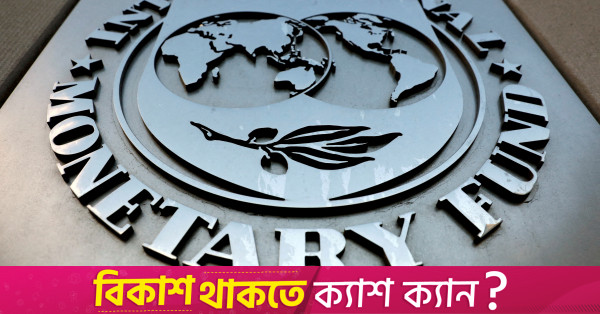The multilateral agency also projected Bangladesh’s inflation to remain elevated, reaching 10% in FY25
The International Monetary Fund (IMF) logo is seen outside the headquarters building in Washington, US, September 4, 2018. REUTERS/Yuri Gripas/File Photo
“>

The International Monetary Fund (IMF) logo is seen outside the headquarters building in Washington, US, September 4, 2018. REUTERS/Yuri Gripas/File Photo
The International Monetary Fund (IMF) has maintained its economic growth forecast for Bangladesh at 3.8% for the current fiscal 2024-25, consistent with its December projection, but anticipates a stronger recovery, forecasting growth of 6.5% in FY26.
The multilateral lending agency also projected Bangladesh’s inflation to remain elevated, reaching 10% in FY25, before cooling down to 5.2% in the next fiscal year, according to its latest edition of the World Economic Outlook released today (22 April).
However, the inflation projection for FY25 is lower than the December forecast of 11%.
The IMF’s projection comes after the Asian Development Bank (ADB), in its latest Asian Development Outlook, expected Bangladesh’s economy to grow by 3.9% in FY25, before increasing to 5.1% in FY26. The ADB also warned that the 12-month average inflation in Bangladesh is expected to rise further to 10.2% in FY25, before easing to 8% in the next fiscal year.
The Manila-based lender also stated that the enduring inflation remains a significant hurdle due to market inefficiency brought on by regulatory shortcomings, restrained competition in wholesale markets, insufficient market information, supply chain constraints, and depreciation of the taka.
In December last year, the government revised its GDP growth projection for FY25 downward to 5.25%, from the initial estimate of 6.75%, due to ongoing financial crisis and political volatility following the government changeover.
Zahid Hussain, former lead economist at the World Bank’s Dhaka office, told TBS, “Following the imposition of tariffs by the United States on various countries, the IMF lowered its global growth projection. Applying a specific methodology to calculate the net impact of the global downturn, the IMF has also adjusted Bangladesh’s growth projection accordingly.”
Regarding 6.5% growth for next fiscal year, he commented that given the current global and domestic context, such a high growth estimate appears “overly optimistic.”
“We still don’t know what will happen regarding the tariff policies of the Trump administration. Additionally, there is political uncertainty at the domestic level. Even if an election takes place next year, it will take time for investment and economic activities to gain momentum — and the benefits of that may not be felt by 2026,” said the economist.
He further said, “The IMF has stated that due to the tariffs imposed by Trump, consumer demand in the US will decline. As a result, although some opportunities may arise for Bangladesh – such as receiving orders diverted from China – there will still be some overall negative impact.”
Agreeing with the inflation projection, the economist said that prices of fuel and coal are declining in the international market, and the value of the dollar is also falling. “As a result, the inflation rate is expected to decrease slightly.”
Global growth to tumble
The IMF has projected a decline in global growth following a period of steady but underwhelming performance, amidst policy shifts and emerging uncertainties.
Global growth is projected to fall from an estimated 3.3% in 2024 to 2.8% in 2025, before recovering to 3% in 2026.
This is lower than the projections in the January 2025 WEO Update, by 0.5 percentage point for 2025 and 0.3 percentage point for 2026.
“The downgrades are broad-based across countries and reflect in large part the direct effects of the new trade measures and their indirect effects through trade linkage spillovers, heightened uncertainty, and deteriorating sentiment.” reads the report.
Global inflation is expected to fall from an annual average of 5.7% in 2024 to 4.3% in 2025 and 3.6% in 2025.
The report states, “The inflation outlook as a whole has improved but has not yet fully returned to pre-pandemic patterns, and it is subject to high uncertainty. In particular, the effects of recently imposed tariffs on inflation across countries will depend on whether the tariffs are perceived to be temporary or permanent, the extent to which firms adjust margins to offset increased import costs, and whether imports are invoiced in US dollars or local currency.


